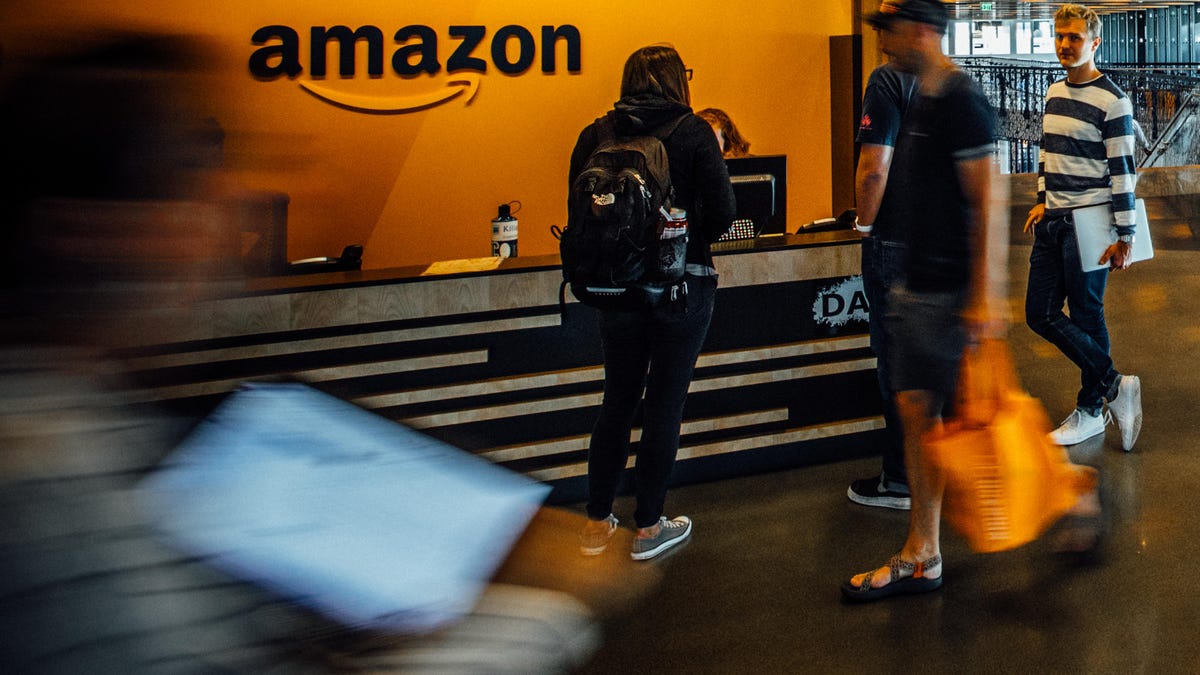The death of Amazon’s 1-Click patent could save shoppers
A key Amazon patent that got you into online shopping is set to expire Tuesday, giving a chance for rival retailers to make online shopping much easier.

In the lobby of Amazon's Day 1 headquarters in Seattle.
Amazon's controversial 1-Click patent opens with a summary that's decidedly dry. It reads: "A method and system for placing an order to purchase an item via the Internet."
Despite its stiff language, that US patent, which was granted in 1999, helped open the internet to droves of shoppers by allowing customers on Amazon.com to buy stuff with -- you guessed it -- just one click. It also became a lightning rod for what's wrong with the US patent system, with some griping that too many and too broad patents were getting OK'd.
With the patent set to expire Tuesday, the change could shake the world of payments. It's a world that's gotten particularly messy and confusing in recent years as you have to grapple with multiple ways to buy that new frying pan online. The good news is the sites you visit will now be able to get their hands on the 1-Click technology without having to cough up licensing fees to Amazon in the process, leading to a more consistent experience regardless of where you shop.
Shopping on the mobile web, a big nuisance for customers, could start seeing improvement as more retailers adopt simpler payment systems. For now, shopping cart abandonment, the term for people adding items into their virtual shopping baskets but not completing purchases, is rampant on mobile.
Also, PC shopping -- where the bulk of online purchasing happens today -- could be streamlined thanks to an initiative including Google, Apple and Facebook. This project would let customers add payments information into their web browsers and use these credentials at any participating website. The process could be even faster than auto-filling your payments and shipping data.
Amazon's 1-Click patent was filed in 1997 and granted in late September 1999, back when many people were leery about buying on the internet and skeptical of its benefits. Amazon used the patent to ease more people into online shopping. It also used it to gain an upper-hand over rivals, suing Barnes & Noble the month after it got the patent to prevent the competing bookseller from using a similar technology on its own website. The suit was settled in 2002. Apple in 2000 started licensing 1-Click technology to power Apple.com and later iTunes, letting customers easily buy laptops or new songs.
In 2000, Amazon CEO and founder Jeff Bezos even addressed the controversy around 1-Click, which is a fairly simple technology to code, by suggesting patents should have much shorter lifespans and noting that Amazon's competitive advantage will come from better "service, price, and selection." But he declined to give up the 1-Click patent.
Amazon didn't respond to a request for comment for this story.
Buying Big Macs
It's not like everyone in retail has been waiting for Amazon's patent to run out to make improvements, so a lot has changed in the past two decades. The problem is that too many companies have come out with competing ideas on what the future of payments should look like, from Apple Pay to Android Pay to Samsung Pay to Walmart Pay (there are more).
You can now buy a Big Mac at McDonald's with the swipe of your watch, pay your bills through your phone's banking app, or complete a purchase at a new e-retailer in a few clicks using PayPal One Touch, Visa Checkout or Mastercard's Masterpass. The reason so many of these payment methods exist is that these companies are still trying to figure out what customers want to use while also fighting each other to make sure they can take a cut of every sale.
Amazon, too, didn't just rest on its payments laurels. It's introduced voice shopping through its Echo smart speaker, purchasing with physical Dash buttons for Trojan condoms and Slim-Jims, and even taught your printer to automatically repurchase its own ink. (Separately, the company has started filing several patents for drone deliveries, pointing to what could become a new big battleground in retail.)
The next step may be more biometrics, with iris scanning and facial recognition becoming more common forms of payments, cutting out the need to even push a button.
While making payments a little easier should help other retailers compete against Amazon, it won't fix all their problems, Tom Forte, an e-commerce analyst for DA Davidson warned. Amazon became a big deal in retail by offering a lot of stuff at cheaper prices with fast, free shipping, he said. Tech like 1-Click provided an additional advantage, but isn't the sole reason you spend all your time shopping there.
That means improving the website for a lousy product won't solve anything.
"If the consumer doesn't want to buy your product," Forte said, "it doesn't matter how easy it is to buy it."
The Smartest Stuff: Innovators are thinking up new ways to make you, and the things around you, smarter.
iHate: CNET looks at how intolerance is taking over the internet.

